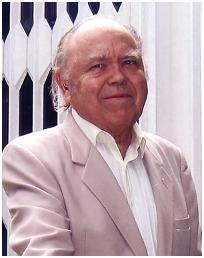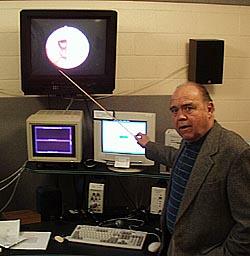Richard Miller
9 April 1926 – 5 May 2009
Richard Miller's rich performance career was distinguished by diversity in opera (some 50 roles in more than 450 performances), oratorio
and recital, in Europe and America. He was known internationally for master classes in systematic vocal technique and artistic
interpretation presented in 38 states of the U.S., in Europe, Australia, Canada, and New Zealand. Research and teaching projects have been
undertaken in 14 European countries.
Miller taught 28 years at the Mozarteum International Summer Academy, Salzburg, Austria. Beginning in 1982, he presented countless
week-long master classes at the Foundation Royaumont, the major French conference center for music. Engaged by the French Ministry of
Culture as an expert pedagogic consultant in 1983, he offered courses in voice pedagogy for teachers and students of the French national
conservatory system, presented lectures and classes at the Paris Conservatoire Superieure, at the Marseilles National Opera School, and at
Centre Polyphonique. In May 1990, he was decorated Chevalier/Officier into the French Order of Arts and Letters at the hand of Madame
Regine Crespin "in recognition of contributions to the art of vocalism in France and throughout the world."
He is the author of many standard books on voice pedagogy and performance, including:
* English, French, German and Italian techniques of singing (Scarecrow, 1977, reissued 1997)
* The structure of singing (Schirmer Books/Macmillan, 1986)
(published by the French Ministry of Culture as La structure du chant, 1990)
* Training tenor voices (Schirmer Books/Macmillan, 1993. Korean edition, 1994)
* On the art of singing (Oxford University Press, 1996)
* Singing Schumann: an interpretive guide for performers (Oxford University Press, Summer 1999)
* Training soprano voices (Oxford University Press, Spring, 2000. Korean edition, 2004)
* Solutions for singers: tools for performers and teachers (Oxford University Press, January 2004)
* Securing baritone, bass-baritone, and bass voices (Oxford University Press, Spring 2007)
He is editor of Liszt: 25 French and Italian songs for voice and piano, 15 songs by Max Reger (International Music, 2002), and Liszt: 22
German songs for voice and piano, in high and low editions (International Music, 1998).
Miller served as Wheeler Professor of Music Performance at the Oberlin Conservatory of Music from 1964–2004.
Oberlin obituary
Oberlin is deeply saddened to report the death of Professor Emeritus of Voice, Richard Miller. Richard died Tuesday, May 5th, 2009.
It is impossible to capture in words the significance of Richard's contribution to the field of music as an artist, teacher, and mentor;
it was utterly extraordinary. After 42 years of advancing the art of teaching and the name of the Oberlin Conservatory of Music, Richard
retired at the end of the 2005/06 academic year. His students have continually occupied the great performance stages of the world
and have transmitted his passion for music to audiences and students alike. His innovative approach to teaching has been well documented
through his prodigious output as a scholar and his methods have shaped the curricula of private teachers and conservatories throughout the
world.
An adjunct staff member in the Cleveland Clinic Foundation's Otolaryngology, Head, and Neck Surgery Department, an associate of Collegium
Medicorum Theatri, and a member of the American Academy of Teachers of Singing, Richard was a frequent adjudicator for vocal performance
competitions around the world. He wrote eight textbooks and more than 100 articles on voice pedagogy research and performance, and edited
three collections of songs.
Richard founded Oberlin's Otto B. Schoepfle Vocal Arts Center, an acoustic laboratory that measures vocal production and provides visual
and auditory feedback to the singer. The center was the first of its kind to be based within a music school.
He was honored many times for his contributions to the profession. He won the Voice Foundation of America's Voice Education Research and
Awareness Award in 2006, the New York Singing Teachers Association's Recognition Award for Excellence in Teaching in 2002, and was honored
with the French Ministry of Culture's Chevalier/Officier, L'Ordre des Arts et des Lettres in 1990.
Richard was an avid painter, gardener, and pianist, and vigorously pursued his work following his retirement from Oberlin. He will be
greatly missed by all of us.
In RA format
Several years ago, there was a heated debate about Miller's singing and teaching (and his tenor voice book) on the long-defunct
Grandi-Tenori internet forum, where some "experts" claimed that the Miller technique produced constricted high notes. With regard to that
debate, one of his ex-students told me:
Miller had an unusual voice, and I feel that many students unconsciously took on some of
it's characteristics.
His singing is perfectly ok, I think. He was a 'tenore di grazia'. Alright, the instrument
was not sumptuous, but were the instruments of, say, Kraus or Gedda sumptuous?
Miller had a rather dry and slightly driven middle voice, partly due to a stiff neck he had
to deal with after a head-on crash with a Greyhound bus back in the mid-60's. He had a
sizzling top, which reminded me of Escalaïs. D-natural, E-flat, with unbelievable
overtones. As to the constriction and overbrightness of his students, I can well remember
HIS asking ME to help a young baritone who was his student, during my days at Oberlin,
who Richard felt was overbrightening and pressing the voice, as Richard just had a
communication problem with this young baritone, who possessed a beautiful instrument.
By the way this ex-student had no problem with Cs, they were not constricted.
In RA format
I would like to thank Thomas Silverbörg for the recordings and pictures.
|


